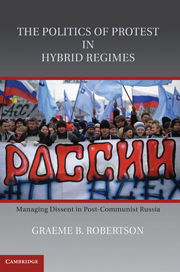Book contents
- Frontmatter
- Contents
- List of Tables
- List of Figures
- Acknowledgments
- Introduction
- 1 Protest and Regimes
- 2 Protest and Regime in Russia
- 3 The Geography of Strikes
- 4 A Time for Trouble
- 5 Elections and the Decline of Protest
- 6 Vladimir Putin and Defeat-Proofing the System
- 7 Protest, Repression, and Order from Below
- 8 Implications for Russia and Elsewhere
- Bibliography
- Appendix 1 Event Protocol
- Appendix 2 Sectoral and Seasonal Strike Patterns
- Appendix 3 A Statistical Approach to Political Relations
- Index
6 - Vladimir Putin and Defeat-Proofing the System
Published online by Cambridge University Press: 10 January 2011
- Frontmatter
- Contents
- List of Tables
- List of Figures
- Acknowledgments
- Introduction
- 1 Protest and Regimes
- 2 Protest and Regime in Russia
- 3 The Geography of Strikes
- 4 A Time for Trouble
- 5 Elections and the Decline of Protest
- 6 Vladimir Putin and Defeat-Proofing the System
- 7 Protest, Repression, and Order from Below
- 8 Implications for Russia and Elsewhere
- Bibliography
- Appendix 1 Event Protocol
- Appendix 2 Sectoral and Seasonal Strike Patterns
- Appendix 3 A Statistical Approach to Political Relations
- Index
Summary
“It should be remembered that the word ‘democracy’ which is used so frequently in the modern mass media, is by no means the same word ‘democracy’ as was so widespread in the nineteenth and early twentieth centuries. The two words are merely homonyms. The old word democracy was derived from the Greek ‘demos’, while the new word is derived from the expression ‘demo-version’.”
Viktor Pelevin, Generation P.If few people outside of the Kremlin had heard of Vladimir Putin in August 1999, by the time he stood down as President in May 2008, the former KGB colonel was a household name. Moreover, in stepping down and transferring power to an elected successor, Putin was taking a historic step: Executive power in Russia had changed hands through the ballot box for only the second time in history.
Well, yes and no. The ballot box had played a role in that the new president, Dmitri Medvedev, had won the elections with 70 percent of the first-round votes. However, the elections hardly represented much of a choice, pitting Putin's chosen successor and the enormous resources of the Russian state against two veteran politicians with four presidential election defeats between them and a little-known liberal allegedly with close ties to the Kremlin. Furthermore, not only was the manner of the transfer of power controversial, it was unclear whether power had really changed hands.
- Type
- Chapter
- Information
- The Politics of Protest in Hybrid RegimesManaging Dissent in Post-Communist Russia, pp. 147 - 166Publisher: Cambridge University PressPrint publication year: 2010



